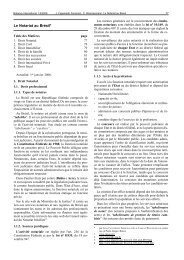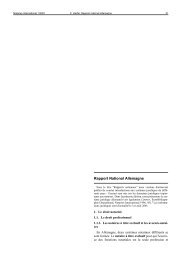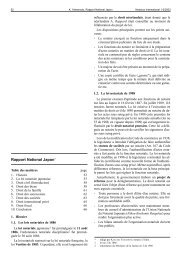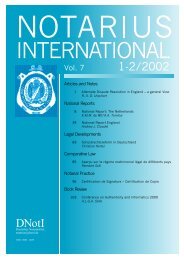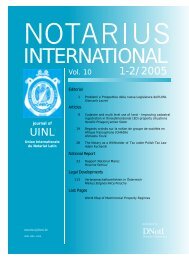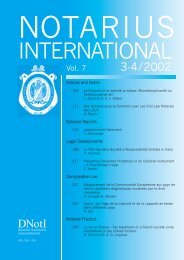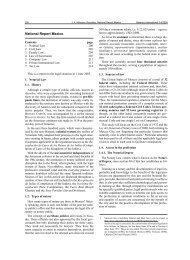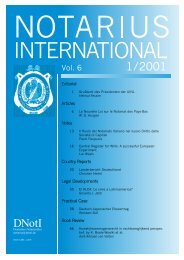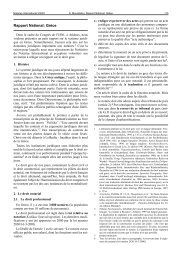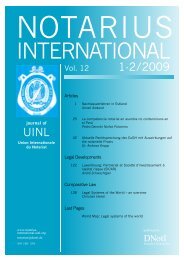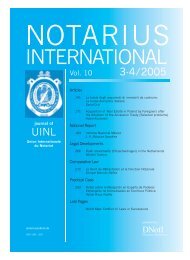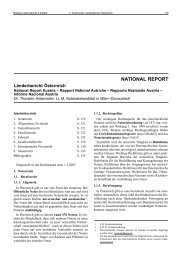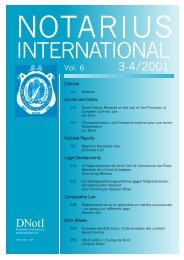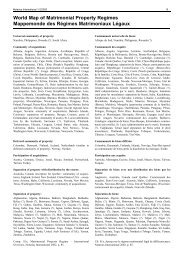National Report Mongolia - Notarius International
National Report Mongolia - Notarius International
National Report Mongolia - Notarius International
Create successful ePaper yourself
Turn your PDF publications into a flip-book with our unique Google optimized e-Paper software.
28 D. Yanjinkhorloo, <strong>National</strong> <strong>Report</strong> <strong>Mongolia</strong> <strong>Notarius</strong> <strong>International</strong> 1-2/2004<br />
<strong>National</strong> <strong>Report</strong> <strong>Mongolia</strong><br />
Contents<br />
page<br />
1. Notarial law 28<br />
2. General civil law 30<br />
3. Property law 31<br />
4. The law of persons and family law 33<br />
5. The law of succession 35<br />
6. Company law 36<br />
7. Private international law 37<br />
8. Tax law 38<br />
9. Bibliography and Internet 38<br />
This report relates to the legal position as at 1.12.2004.<br />
The report mainly focuses on the new Civil Code that<br />
came into force on 1 September 2002.<br />
1. Notarial law<br />
1.1. Law governing the profession<br />
1.1.1. General aspects<br />
The work of notaries is carried on in <strong>Mongolia</strong> by independent<br />
professional notaries and State court officials.<br />
According to the statutory definition, an independent<br />
professional notary is a person who acts in an official<br />
capacity based on his State appointment as a notary and<br />
receives his income from the fees charged for that purpose.<br />
An independent professional notary must be a <strong>Mongolia</strong>n<br />
national with full legal qualifications (i.e. someone<br />
who has completed a 4-5 year course of legal studies)<br />
who has also passed the examinations organised by<br />
the Chamber of Notaries and has at least three months'<br />
practical experience as a notary or has completed practical<br />
training to become a notary. The exam may be taken<br />
only by lawyers who have already passed the <strong>Mongolia</strong>n<br />
bar exam. 1<br />
State court officials who undertake notarial functions<br />
are special officials in district authorities (Sum) 2 and in<br />
<strong>Mongolia</strong>n diplomatic missions and consulates abroad<br />
who also undertake authentication work alongside their<br />
other duties by State appointment. Under the law the district<br />
chief executive 3 of each district authority (Sum) decides,<br />
with the approval of the Minister of Justice, whether<br />
certain Sum officials should simultaneously undertake<br />
official notarial duties in district authorities (Sum) in<br />
which no independent professional notaries have been<br />
appointed (art. 14.3 of the Notaries Act).<br />
1.1.2. Legal sources<br />
The first department within the Justice Ministry that<br />
was to be responsible for the authentication of contracts<br />
was founded in the year 1925. In 1941 the first Notarial<br />
Regulations were passed; these have now been the subject<br />
of many amendments.<br />
During the reform of the <strong>Mongolia</strong>n legal system, 4<br />
which began after the new Constitution was ratified in<br />
1992, a new Act governing the Notarial Profession of<br />
2.5.1997 5 was also passed to regulate the profession of<br />
notary. Some minor changes have been made be an act of<br />
23.5.2002.<br />
The Ministry of Justice has enacted Service Regulations<br />
for the notaries on 5.7.1997 which have been<br />
amended most recently on 11.2.2003. The first plenary<br />
session of the Chamber of Notaries convened on<br />
28.6.1997 also ratified the rules on notarial ethics.<br />
1.1.3. Access to the profession<br />
Only as many notaries are appointed as are required<br />
(numerus clausus). The head (Zasag Darga) of each administrative<br />
district (Aimag) or capital city 6 draws up a<br />
recommendation on the number of notaries required having<br />
regard to the population and economic strength of the<br />
area and probable developments, and forwards that recommendation<br />
to the Ministry of Justice.<br />
* by Mrs. DAMBADARJAA YANJINKHORLOO, Notary and Professor at the<br />
State University Institute of Law, Ulaanbaataar, <strong>Mongolia</strong>. The author<br />
would like to thank Mrs. AYUSHIIN OYUNCHIMG, President of the<br />
<strong>Mongolia</strong>n Chamber of Notaries, for many important contributions to<br />
this article.<br />
1 Law on the selection among lawyers of 22. May 2003.<br />
2 The <strong>Mongolia</strong>n administration is structured on the highest level by 21<br />
”Aimag” (sometimes also transcribed “Aimak” – comparable to a region).<br />
Every Aimag compasses several”Sum” (sometimes also transcribed<br />
“Somon” – comparable to an English county) or ”Duureg” in<br />
the capital city of Ulaan Baator. The municipalities or local communities<br />
are called “Bag” in <strong>Mongolia</strong>n.<br />
3 The Zasag Darga is the highest administrative officer in the district<br />
authority (Sum) as well as the most senior official in the administrative<br />
district (Aimag). The Zasag Darga of a district authority is therefore<br />
translated here as district chief executive, whilst the Zasag Darga<br />
of an Aimag is translated as administrative district officer.<br />
4 Cf the report by the Asian Development Bank (a regional international<br />
organisation along the lines of the World Bank) of October 1995:<br />
„Developing <strong>Mongolia</strong>'s Legal Framework: A Needs Analysis“:<br />
http://www.adb.org.Documents/Papers/<strong>Mongolia</strong>_Legal_Framework<br />
which uses not so flattering words to describe the previous state of<br />
the <strong>Mongolia</strong>n notarial system:<br />
„Notaries have been used in <strong>Mongolia</strong> for some time. Unlike the laws<br />
that apply to prosecutors and advocates, the Law on Notaries has not<br />
been substantively changed since the transition to a market economy<br />
began although a draft law is in preparation. There is a feeling among<br />
notaries that a new law would help to clarify their role.<br />
Notaries generally form part of the local aimag administrations with<br />
one notary per aimag, and their offices are financed and their salaries<br />
paid out of the aimag budget. There are also at least five independent<br />
notaries in Ulaanbaatar.<br />
Notaries are used to authenticate documents. They are not involved<br />
in drafting or in advising the parties of a documents contents, but<br />
simply in checking that documents are in order and signing or stamping<br />
them. The types of transaction for which notarisation is required<br />
are bank loans and agreements for the sale and purchase of items such<br />
as livestock. With the emergence of a leasehold market and the anticipated<br />
privatisation of housing, it is expected that notaries' responsibilities<br />
will increase.<br />
The work of the notaries has changed considerably in the last few<br />
years and it is not always clear to them how they are expected to do<br />
their work under the new system. Neither are there any modern texts<br />
to be used as a reference. The volume of work has also increased dramatically,<br />
although there does not seem to be an immediate need for<br />
more than the approximately 25 notaries now working in <strong>Mongolia</strong>.“<br />
http://www.adb.org/Documents/Papers/<strong>Mongolia</strong>_Legal_Framework/<br />
the_ notaries.asp?p=lawdevt<br />
5 State Bulletin No. 6/1997, pages 540-553. Unfortunately we do not<br />
know of any English, French or German translations of the Notaries<br />
Act.<br />
6 Act on State Stamp Duties, State Bulletin No. 4-5/2001, pages 525-<br />
535. On internet: http://www.investmongolia.com/law36.pdf
<strong>Notarius</strong> <strong>International</strong> 1-2/2004 D. Yanjinkhorloo, <strong>National</strong> <strong>Report</strong> <strong>Mongolia</strong> 29<br />
Local jurisdiction and numbers of notaries to be appointed<br />
are matters determined by the Minister of Justice.<br />
At the present time there are 121 notaries officiating in<br />
the eight municipal districts of the capital city of Ulaanbaatar<br />
and 65 notaries in the other administrative districts<br />
(Aimag). <strong>Mongolia</strong> therefore currently has 186 (independent<br />
professional) notaries. Alongside these there<br />
are 317 administrative officers in the various district authorities<br />
(Sum) and 33 officials within <strong>Mongolia</strong>'s foreign<br />
missions and consulates acting in an ancillary capacity as<br />
State court officials.<br />
1.2. The functions of the notary<br />
A notarised deed is required, in particular, for the following<br />
legal transactions:<br />
- A promise of a gift (Article 276.4 of the Civil Code),<br />
- Documents for entry in the Land Register (Article<br />
13.6, 13.8, 17.1.11, 17.2, 19.2, 21.2, 21.5, 24.1, 28.2,<br />
30.1, 34.3, 35.1, 35.3.6, 36.1, 36.6 Property Registration<br />
Act), 7<br />
- Incorporation documents for a legal entity under private<br />
law (art. 14.4 Law on State Registration of Legal<br />
Entities 8 ) and for its articles of association (art. 7.1.4<br />
and 7.1.5 of the Law on State Stamp Duties 9 ),<br />
- Marriage contracts to regulate matrimonial property<br />
(Article 132.2 of the Civil Code),<br />
- Wills (Article 523.1 of the Civil Code) and certificates<br />
of inheritance (Article 531.1 of the Civil Code),<br />
- for the authentication of signatures (art. 7.1.9 of the<br />
Stamp Duty Act),<br />
- to certify the truth and accuracy of a document (art.<br />
7.7 of the Stamp Duty Act),<br />
- to certify the truth and accuracy of a translation (art.<br />
7.8 of the Stamp Duty Act).<br />
All types of real-estate contracts must also be notarially<br />
authenticated and entered in the Land Register (Land<br />
Registry), otherwise they will be void. Since the enactment<br />
of the Law governing the State Registration of<br />
Property Rights and other Rights to Assets of 19.6.2003<br />
(in force since 29.6.2003) the following rights also have<br />
to be registered in the State Register (Land Register):<br />
- Title to real estate,<br />
- Security rights over real estate,<br />
- Leases of real estate,<br />
- Easements and usufructs,<br />
- Building rights over land belonging to another,<br />
- Possession and usage of land.<br />
All of the aforementioned legal transactions have to be<br />
authenticated by a notary. Transactions that are concluded<br />
without observing the statutorily or contractually required<br />
form or that are not given corresponding approval<br />
will be null and void (Article 56.1.8 of the Civil Code). If<br />
notarial authentication is prescribed by law a notary or<br />
some other person designated by law must undertake authentication<br />
on the conclusion of the transaction (Article<br />
42.4 of the Civil Code). Legal transactions disposing of<br />
real estate or rights of inheritance can only be authenticated<br />
by a notary practising in the district in which the assets<br />
are situated. 10<br />
Notaries and State court officials can also authenticate<br />
legal transactions and contracts other than the aforementioned<br />
if so requested by the parties, provided that they<br />
do not contravene the law.<br />
1.3. Authentication procedure<br />
As yet, authentication procedure is only governed by<br />
the Regulations on the Conduct of Notarial Transactions<br />
(Service Regulations for Notaries) 11 – and not by any<br />
formal legislation. Art. 4.1 of the Service Regulations<br />
provides that notaries are to authenticate legal transactions<br />
and contracts pursuant to the Notaries Act. Notaries<br />
and court officials authenticate legal transactions and<br />
contracts in the presence of the parties, giving explanations<br />
on statutory standards of validity, legal consequences<br />
and liability arising from the transactions concerned.<br />
When authenticating a legal transaction the notary has<br />
to examine whether the transaction complies with statutory<br />
requirements; he then has to affix a certificate and<br />
certify the signatures in the presence of the parties (Article<br />
4.1 of the Service Regulations). The notary has to examine<br />
the deed in full. He also has to read it out, if he has<br />
drafted the contract by himself (art. 4.1.5 of the Service<br />
Regulations). Also the notary has to clarify whether the<br />
parties are conscious of the legal consequences of the<br />
transaction. Generally, the wording will not be drafted by<br />
the notary himself, but by either the parties or their lawyers.<br />
All notaries have standard forms available for certain<br />
kinds of contract. The contracting parties can buy<br />
these forms and fill them out themselves.<br />
Contracts that have to be certified by a notary must<br />
meet the following requirements:<br />
- they must comply with the law,<br />
- they must clearly set out the content and principal<br />
terms of the contract,<br />
- they must clearly set out the rights and obligations of<br />
the parties,<br />
- they must satisfy the principle of equality between the<br />
parties,<br />
- they must not contain grammatical errors,<br />
7 „Law on State Registration of Property Rights and other Rights to Assets“<br />
of 19. June 2003, State Bulletin No. 25/2003.<br />
Previous version see: „Law on Registration of Immovable Property“<br />
of 9 January 1997, State Bulletin No. 3/1997, in force since 1.5.1997.<br />
English translation available on the internet at: http://www.investmongolia.com/law23.pdf<br />
or: http://www.cis-legal-reform.org/document.asp?id=2386.<br />
8 „Law on State Registration of Legal Entities“ of 23. May 2003, in<br />
force since 1. October 2003.<br />
9 English translation of the „Law on State Stamp Duties“ available on<br />
the internet at http://www.investmongolia.com/law36.pdf<br />
10 This rule was introduced by the Notaries Amendment Act of<br />
23.5.2002 (State Bulletin No. 21/2002).<br />
11 The service regulations have not been published in the State Bulletin<br />
as they are administrative regulations laid down by the Justice Minister.
30 D. Yanjinkhorloo, <strong>National</strong> <strong>Report</strong> <strong>Mongolia</strong> <strong>Notarius</strong> <strong>International</strong> 1-2/2004<br />
- they must be stamped and signed by persons having<br />
legal authority to do so,<br />
- deadlines must be clearly laid down and the consequences<br />
of non compliance with deadlines must be<br />
stated,<br />
- default interest and other compensation must be clearly<br />
stated.<br />
1.3.1. Creation of land charges<br />
When authenticating security agreements relating to real<br />
estate the notary is also obliged:<br />
- to examine proof of title to the real estate secured and<br />
to obtain certification from the Land Registry,<br />
- to enter the time and date of authentication of the creation<br />
of the land charge in his own registers,<br />
- where a land charge is jointly created by spouses, to<br />
examine whether all of the adult members of the family<br />
have given their consent in writing and whether<br />
their signatures have been notarially certified,<br />
- to examine whether the real estate secured has already<br />
been given as security, whether the giving of security<br />
is prohibited or whether seals have been affixed by the<br />
court, the police or any other competent authority.<br />
1.3.2. Life annuity agreements<br />
The following also applies to the authentication of<br />
agreements on annuities (Articles 483-485 of the Civil<br />
Code):<br />
- the notary must check whether the party under the liability<br />
is in a position to meet his obligations (e.g. to<br />
provide accommodation, service, care or medical assistance<br />
at his own expense or at the expense of the<br />
party entitled to benefit).<br />
- the notary must check certifications by the mayor of<br />
the municipal authority or the doctor as to whether the<br />
party entitled to benefit is unable to maintain himself<br />
or live independently.<br />
- a person must be designated to monitor performance<br />
of the contract.<br />
1.3.3. Document roll and language of authentication<br />
The notary must keep a list of all of his authentications<br />
and make any additional notes, where necessary.<br />
The language of authentication is <strong>Mongolia</strong>n. Authentication<br />
in a foreign language is not allowed; however,<br />
a notary can certify the accuracy of a translation himself<br />
if he has a good command of that foreign language.<br />
Otherwise the translation must be carried out by an authorised<br />
translator and will then be merely certified by<br />
the notary. The notary does not draw up his own deed but<br />
affixes his stamp to the translation showing the registration<br />
number of the notary in question.<br />
1.4. Notarial fees<br />
Notarial fees are governed by the Stamp Duty Act (Article<br />
7 of the Stamp Duty Act – which can also be translated<br />
as the „Act governing State Fees“ or Cost Act) 12<br />
In 1997 the Minister of Justice brought in Regulations<br />
on Notarial Fees which, in addition to the fixed rates laid<br />
down in the Costs Act, also regulate other notarial fees.<br />
The Regulations on Notarial Fees have been revised in<br />
2003 in order to incorporate the notaries' new functions<br />
under the 2002 Land Privatisation and Property Act. State<br />
court officials have to forward all income from their notarial<br />
duties to the State, whereas independent professional<br />
notaries keep the fees themselves.<br />
- Fixed fees are laid down for almost all official actions<br />
taken by notaries (i.e. fees are not governed by value);<br />
they are determined according to the nature of the official<br />
activity and amount to between 200and 200,000<br />
tugrig (1,000 tugrig is the equivalent of approximately<br />
one US$).<br />
- On transactions up to a value of 100,000 tugrug, however,<br />
a value-based fee of 0.5% of the purchase price<br />
or value of the property has to be paid to the notary.<br />
For transactions of higher value, the following table<br />
applies:<br />
value of the transaction notary's fee<br />
1,000,001 – 10,000,000 10,000 Tugrug<br />
10,000,000 – 25,000,000 25,000 Tugrug<br />
25,000,001 – 100,000,000 50,000 Tugrug<br />
100,000,001 – 300,000,000 100,000 Tugrug<br />
more than 300,000,001 200,000 Tugrug<br />
- Together with the new „Law on State Registration of<br />
Property Rights“, in 2003 also new registration fees<br />
for the landregister have been introduced, such as for<br />
a mortgage a value based fee of 0.1%, otherwise fees<br />
between 100 and 60,000 Tugrug.<br />
1.5. Professional association<br />
All independent professional <strong>Mongolia</strong>n notaries are<br />
members of the <strong>Mongolia</strong>n Chamber of Notaries; this<br />
enables their activities to be coordinated throughout the<br />
whole nation. The <strong>Mongolia</strong>n Chamber of Notaries is a<br />
non-profit-making legal entity with which all notaries<br />
have to be registered before they are allowed to practise.<br />
The Chamber of Notaries was set up in 1997 under the<br />
first Notaries Act. 13<br />
Branches of the Chamber of Notaries exist in the capital<br />
as the Capital Council and in all 21 Aimags as Aimag<br />
Councils (Article 6.2 of the Notaries Act).<br />
2. General civil law<br />
2.1 Civil Codes after 1926<br />
After the success of the People's Revolution in <strong>Mongolia</strong><br />
in 1921 and <strong>Mongolia</strong>'s declaration of independence<br />
from China, the first <strong>Mongolia</strong>n Civil Code was enacted<br />
12 State Bulletin No. 4-5/1993, pages 525-535. English translation of<br />
the „Law on State Stamp Duties“ available on the internet at:<br />
http://www.investmongolia.com/law36.pdf.<br />
13 The <strong>Mongolia</strong>n Chamber of Notaries' home page can be found on the<br />
internet at: http://www.owc.org.mn/notariat/ (unfortunately at present<br />
only in <strong>Mongolia</strong>n; there is still no English home page).
<strong>Notarius</strong> <strong>International</strong> 1-2/2004 D. Yanjinkhorloo, <strong>National</strong> <strong>Report</strong> <strong>Mongolia</strong> 31<br />
in 1926. It took as its model the former Russian (Soviet)<br />
Civil Code. The Civil Code was later amended and reformed<br />
several times. 14<br />
When the new democratic Constitution of 13.1.1992 15<br />
was brought in a Civil Code of 1 November 1994 16 was<br />
also enacted. However, this did not quite reflect the free<br />
market economy. However, the Civil Code of 1992/1994<br />
did recognise private ownership alongside State ownership.<br />
2.2. New 2002 version of the Civil Code<br />
The new Civil Code of 10.1.2002 has been in force in<br />
<strong>Mongolia</strong> since 1 September 2002; this can also be<br />
found on the internet in both English and German<br />
translations. 17 It is a complete revision of the former<br />
Civil Code.<br />
It regulates inter alia the property position following<br />
the recent commencement of privatisation of land. It also<br />
contains a number of new legal concepts necessary for<br />
the free market economy, such as self-help, the law of<br />
neighbours, heritable building rights, the pledging of<br />
rights, general terms and conditions, options, pre emption<br />
rights, leasing, land leases, franchise agreements, trusts,<br />
travel agreements, insurance policies etc.<br />
The new <strong>Mongolia</strong>n Civil Code is modelled on major<br />
continental European codifications; it particularly echoes<br />
German law in many respects. However, its provisions<br />
are often briefer and less detailed than in the European<br />
codes.<br />
Important separate private-law Acts alongside the Civil<br />
Code include, in particular, the Consumer Protection<br />
Act of 1 September 1991 (which was brought in even before<br />
the new Constitution was ratified!), reformed by an<br />
act of 26 december 2003, 18 and the Building Act of 7 August<br />
1998. 19<br />
3. Property law 20<br />
3.1. Privatisation of land<br />
In June 2002 the Law of Land 21 and the Law on the<br />
Allocation of Land to <strong>Mongolia</strong>n Citizens for Ownership<br />
22 were enacted. Owner-occupied apartments had already<br />
been privatised in the years 1997-1998 and title<br />
granted free of charge to the occupants concerned. The<br />
Privatisation Act 23 permits <strong>Mongolia</strong>n citizens for the first<br />
time to acquire private ownership of real estate in <strong>Mongolia</strong>,<br />
since before that the State had been the sole owner of<br />
all land even though Article 16(3) of the 1992 Constitution<br />
had made provision for the private ownership of land.<br />
Houses and land, in particular, can now be owned by their<br />
former occupiers. Title to property of up to 700 square<br />
metres can be acquired free of charge for own family use<br />
in the capital and in the Aimag up to 3,500 square metres;<br />
nationals can also purchase additional land (art. 7.1). This<br />
measure will be implemented within 2 years. This means<br />
that approximately 585,000 families 24 will be able to acquire<br />
ownership of the residential land occupied by them.<br />
1.24 million hectares of land have been earmarked for<br />
privatisation, representing approximately 0.9% of the<br />
whole territory of <strong>Mongolia</strong>. 25<br />
The Land Act, on the other hand, governs the use of<br />
land that is still owned by the State.<br />
Under the Act all kinds of undertakings can also acquire<br />
or use land. Foreigners, on the other hand, cannot<br />
acquire land; they can only have use or possession of it<br />
(Article 102.1 of the Civil Code, Article 6.2 of the Constitution,<br />
art. 5.1 of the Land Act). On the other hand, foreign<br />
undertakings or undertakings with foreign associates<br />
may use and acquire land in the same way as other undertakings<br />
(art. 6.3 of the Land Act).<br />
3.2. Disposal of land<br />
The registration of land and transfer of title are governed<br />
by the Act on the State Registration of Ownership<br />
and other Property Rights (Property Registration Act)<br />
of 19.6.2003 (in force since 29.6.2003) 26 and by Article<br />
182 et seq. of the Civil Code.<br />
14 See, with regard to the legal position during Soviet dominance:<br />
WILLIAM E. BUTLERR, The <strong>Mongolia</strong>n Legal System: contemporary<br />
legislation and documentation, 1982.<br />
15 English translation of the Constitution available on the internet at:<br />
http://www.cis-legal-reform.org/document.asp?id=415.<br />
16 Civil Code of 1 November 1994, State Bulletin No. 1/1995, in force<br />
from 1.1.1995 to 30.8.2002; printed version in the English language:<br />
The Civil Code of <strong>Mongolia</strong>, Ulaanbaatar, <strong>Mongolia</strong>, 1994, 101 pages;<br />
on the internet (unfortunately only in <strong>Mongolia</strong>n) at<br />
http://www.cis-legal-reform.org/document.asp?id=2962. See also<br />
STELTER/GÜNTHER, Rechtliche Aspekte der marktwirtschaftlichen<br />
Transformation in der Mongolei, Osteuropa-Recht 1992, p. 309.<br />
17 State Bulletin No. 7/2002. An English translation is available on the<br />
internet at: http://www.investmongolia.co./law04.pdf. A German<br />
translation of the new draft <strong>Mongolia</strong>n Civil Code, which appears to<br />
reflect the final wording of the legislation, is to be found in German<br />
on the internet at: http://www.cis-legal-reform.org/civil-code/index.html#civil-code-mongolia.<br />
cf. also D. NELLE, Privatisierung in der Mongolei erhält neuen Auftrieb,<br />
WiRO (Wirtschaft und Recht in Osteuropa) 2001, 325-332.<br />
18 Old version: State Bulletin No. 3/1991. English translation,<br />
”Consumer Protection Law of <strong>Mongolia</strong>“ available on the internet at:<br />
http://www.investmongolia.com/law06.pdf. New version: State<br />
Bulletin No. 3/2004; compare: NELLE, WiRO 2005, 30.<br />
19 Building Act of 7 August 1998 on the internet (in <strong>Mongolia</strong>n only) at:<br />
http://www.cis-legal-reform.org/document.asp?id=4667.<br />
20 D. NELLE, Immobilienrecht in der Mongolei, WiRO (Wirtschaft und<br />
Recht in Osteuropa) 2004, 293-298, 333-337.<br />
21 Land Act of 7.6.2002, State Bulletin No. 27/2002. English translation:<br />
„Law of Land“ on the internet at http://www.investmongolia.<br />
com/law28.pdf.<br />
The fees for use of land still in State ownership but used by private<br />
persons or undertakings are governed by the „Law on Land Fees“<br />
State Bulletin No. 5/1997 in force since 9.1.1997; http://www.investmongolia.com/law35.pdf.<br />
22 „Law on the Allocation of Land to <strong>Mongolia</strong>n Citizens for Ownership“<br />
of 27.6.2002 State Bulletin No. 27/2002, in force since 1.5.2003,<br />
available on the internet at http://www.investmongolia.com/<br />
law26.pdf.<br />
23 For the earlier position, see the Land Act of 11 November 1994, in<br />
force from 1 April 1995 to 2002 (English translation on the internet at:<br />
http://www.cis-legal-reform.org/document.asp?id=2387); see also the<br />
report of the Asian Development Bank (ADB) (see footnote 3 above),<br />
particularly the section on „Property Rights“: http://www.adb/<br />
org.Documents/Papers/<strong>Mongolia</strong>_Legal_Framework/property<br />
rights.asp.<br />
24 Zuunii medee (daily newspaper), No. 151 of 25.06.2003, page 2.<br />
25 Urdriin sonin (Daily News), No. 114 of 12.05.2003, page 2.<br />
26 „Law on Registration of Immovable Property“ of 9 January 1997,<br />
State Bulletin No. 3/1997, in force since 1.5.1997. English translation<br />
available on the internet at http://www.investmongolia.com/<br />
law23.pdf or at http://www.cis-legal-reform.org/document.asp?<br />
id=2386.
32 D. Yanjinkhorloo, <strong>National</strong> <strong>Report</strong> <strong>Mongolia</strong> <strong>Notarius</strong> <strong>International</strong> 1-2/2004<br />
Entry in the Land Register constitutes acquisition of<br />
title (Article 4 Property Registration Act). An application<br />
to register the acquisition of immovable property in the<br />
Land Register can be made by either the transferor or<br />
transferee (Article 109.1 of the Civil Code).<br />
Registration requires the existence of a notarised deed<br />
(Articles 13.6, 17.1.1, 17.2, 19.2, 21.2, 21.5, 24.1, 28.2,<br />
30.1, 34.3, 35.1, 35.3.6, 36.1, 36.6 of the Property Registration<br />
Act). The notarised deed on the transfer of rights<br />
to immovable property must specify the transfer title<br />
deed. Where someone acts as agent for one of the parties<br />
details of the representative and power of attorney must<br />
be given in the deed, or else the power of attorney must<br />
be attached (Article 109.2 of the Civil Code).<br />
The first step is for the parties entering into a contract<br />
of sale to conclude a private written agreement. The<br />
agreement is drafted by the parties themselves or by their<br />
lawyers. After that, a certificate is obtained from the Land<br />
Registry showing who the owner is and whether the<br />
property has been given as security. The contract is then<br />
authenticated by the notary. After the transfer of title has<br />
been registered by the Land Registry the purchase price<br />
is paid. In many cases 50% of the purchase price is first<br />
paid to the vendor, with the remaining 50% being handed<br />
over once a new certificate is released by the Land<br />
Registry. Notaries do not hold escrow accounts.<br />
As far as the transferee is concerned, the vendor is<br />
deemed to be the owner if he is shown as such in the<br />
Land Register (good faith principle). This does not apply<br />
if the transferee is aware that the vendor is not the<br />
owner (Article 109.3, 183 of the Civil Code).<br />
A purchaser or heir can initially have a kind of caution<br />
registered (caveat), which the owner can have deleted<br />
again if the purchaser does not make payment (Article 21<br />
of the Property Registration Act); caveat protection corresponds<br />
to that provided under German law (Article 185<br />
of the <strong>Mongolia</strong>n Civil Code). An option to purchase<br />
can also be registered in the Land Register.<br />
There are no special rules applicable in <strong>Mongolia</strong> on<br />
the acquisition of property or part of a property where the<br />
vendor is obliged to build a house or apartment at the<br />
same time (along the lines of the German „Bauträgervertrag“<br />
or building contract). Transactions such as this<br />
are treated as works contracts, although this does not fully<br />
reflect the nature and essence of this particular legal relationship.<br />
3.3. Owner-occupied apartments and heritable<br />
building rights<br />
The basic principles governing owner-occupied<br />
apartments are laid down in Articles 142-149 of the Civil<br />
Code, with the details being contained in the „Act on<br />
the Joint Ownership of Apartments“ 27 and the Apartment<br />
Privatisation Act 28 , both of 1996, and the Apartments Act<br />
of 22.4.1999. 29 A law on the legal position of associations<br />
of owner-occupiers and on title to jointly-owned<br />
properties was passed by Parliament on 18.6.2003. It is<br />
mainly modelled on the German Act governing Ownership<br />
of Apartments. Ownership of apartments is ownership<br />
peculiar to apartments (or other premises) giving<br />
joint title to the land and other parts of the building (Articles<br />
142.1 and 2 of the Civil Code). The percentage of<br />
joint title is determined by the proportion that the area occupied<br />
bears to the whole area (Article 142.3 of the Civil<br />
Code). Separate title is only granted if the apartment or<br />
premises are completely separate and self-contained (Article<br />
142.4 of the Civil Code). A notarised deed is also required<br />
in order to acquire title to an owner-occupied<br />
apartment so that it can be entered in the Land Register<br />
(Article 145.2 of the Civil Code).<br />
The heritable building right („building right“) is governed<br />
by Article 150 of the Civil Code. The structure built<br />
as a result of the building right is deemed an integral part<br />
of the building right (Article 150.5 of the Civil Code).<br />
The provisions on the acquisition of immovable property<br />
apply mutatis mutandis to the formation and acquisition<br />
of a building right (Article 150.17 of the Civil Code); a<br />
notarised deed and entry in the Land Register is therefore<br />
required for acquisition in rem. Heritable building rights<br />
are expressly governed by the revised Land Registry<br />
Regulations.<br />
3.4. Limited rights of use of property in rem<br />
Limited rights of use of property in rem known to <strong>Mongolia</strong>n<br />
law are the servitude (Article 151 of the Civil<br />
Code) and the usufruct (Article 152 of the Civil Code),<br />
but not the limited personal easement. The distinction<br />
corresponds to that made under German law: the usufruct<br />
is a comprehensive right of use, whereas the servitude<br />
can take one of the following three forms:<br />
- limited use of the servient tenement,<br />
- a prohibition on the conduct of certain action on the<br />
servient tenement, or<br />
- prevention from exercising certain rights arising from<br />
title to the servient tenement.<br />
3.5. Mortgages/hypothecs<br />
The mortgage is the only security over land in existence<br />
under <strong>Mongolia</strong>n law. An abstract land charge separate<br />
from the debt itself is unknown to <strong>Mongolia</strong>n law.<br />
The mortgage is accessorial. The mortgage and the underlying<br />
receivable can only be assigned together (Article<br />
172.1 of the Civil Code). If the receivable does not<br />
arise, an „owner's mortgage“ is then created (Article<br />
168.1 of the Civil Code). The receivable can be substituted<br />
(Article 165.3 of the Civil Code).<br />
The mortgage is not created until it is entered in the<br />
Land Register (Article 166.1 of the Civil Code). Registration<br />
itself is regulated in the Property Registration Act.<br />
An assignment of the receivable is not valid until the<br />
transfer of the mortgage is entered in the Land Register<br />
27 Act on the Joint Ownership of Apartments of 25 October 1996, State<br />
Bulletin No. 3/1997.<br />
28 Apartment Privatisation Act of 25 October 1996, State Bulletin No.<br />
3/1997; (unfortunately only) <strong>Mongolia</strong>n text on the internet at<br />
http://www.cis-legal-reform.org/document.asp@id=5107.<br />
29 Apartments Act of 22.4.1999, State Bulletin No. 21/1999.
<strong>Notarius</strong> <strong>International</strong> 1-2/2004 D. Yanjinkhorloo, <strong>National</strong> <strong>Report</strong> <strong>Mongolia</strong> 33<br />
(Article 172.2 of the Civil Code). Nor is substitution of<br />
the receivable valid until an entry is made in the Land<br />
Register (Article 165.3 of the Civil Code).<br />
Both the creation of the mortgage and its transfer require<br />
a notarially certified deed (Article 172.2 of the<br />
Civil Code).<br />
Special types exist in the form of the maximum-sum<br />
mortgage (Article 165.2 of the Civil Code) and the security<br />
mortgage (Article 167 of the Civil Code).<br />
4. The law of persons and family law 30<br />
<strong>Mongolia</strong>n law on marriage and children is governed<br />
by the Family Code of 11 June 1999 (in force since<br />
1.8.1999 31 – Article 76.1).<br />
4.1. The law of names 32<br />
The <strong>Mongolia</strong>n language does not distinguish between<br />
forenames and surnames. A name consists of the given<br />
name, plus the father's name (i.e. the father's given name)<br />
(Article 24 of the Family Code). A given name can consist<br />
of several components (such as „Dambadarjaa“), or<br />
even be linked with a hyphen (e.g. Altan Ochir). 33<br />
This is why there is often confusion between the two<br />
names. On identity cards the names are shown in the following<br />
order:<br />
- Tribal name (Ovog): Tribal names have been allowed<br />
(again) for the last few years. (The tribal name is<br />
therefore shown on identity cards but not in passports).<br />
- After that comes the father's name („surname“: Etsgiin<br />
ner),<br />
- the given name („first name“: Ner) is given last.<br />
For example, my tribal name is Borjigin, the tribe of<br />
Chingis Khan, which is why half of all <strong>Mongolia</strong>ns<br />
choose this tribal name. Everyone is free to choose his<br />
own. My full name is therefore Borjigin (tribal name)<br />
Dambadarjaagiin (father's name, i.e. my father's given<br />
name, with giin being the genitive ending) Yanjinkhorloo<br />
(my own given name).<br />
In passports however this order is reversed to the internationaly<br />
used order (i.e. first of all, the given name<br />
followed by the father's name; the tribal name is not stated).<br />
4.2. Matrimonial law and relationships akin to marriage<br />
4.2.1. Marriage and divorce<br />
Marriage is governed by Article 4 et seq. of the Family<br />
Code.<br />
Divorce can be pronounced either by the administrative<br />
authorities (registry office divorce) provided that both<br />
spouses agree to the divorce, do not have any children below<br />
the age of 18 years and that there is no property dispute<br />
(Article 13 of the Family Code). Otherwise there is<br />
the judicial divorce (Article 14 of the Family Code). 34<br />
4.2.2. Family property<br />
The law of matrimonial property as well as family<br />
property is set out in Article 125 et seq. of the Civil<br />
Code 35 (referred to in Article 20 of the Family Code).<br />
Assets acquired by the spouses during marriage are not<br />
only the communal property of the spouses (as would be<br />
the case with community of acquests) but are also communal<br />
family property – that is to say, including the<br />
children (but not the spouses' parents). This reflects the<br />
traditional significance of the clan in <strong>Mongolia</strong>n society.<br />
Communal property is the property that one of the<br />
spouses or children acquires after the marriage during<br />
their communal life together (Article 126 of the Civil<br />
Code), particularly:<br />
- the income from work or capital received by a member<br />
of the family,<br />
- replacements acquired from communal property,<br />
- sole property allocated to communal property by one<br />
of the spouses or another member of the family,<br />
- an increase in the value of the sole property of one<br />
spouse due to improvements by a member of the family.<br />
The sole property of one of the spouses or of a member<br />
of the family is made up of (Article 127 of the Civil<br />
Code):<br />
- the property brought into the marriage,<br />
- property acquired during the marriage by gift or on<br />
death,<br />
- income from intellectual property and royalties,<br />
- and replacements acquired from sole property.<br />
Each member of the family is entitled to hold, use,<br />
manage and consume his or her own property at his or her<br />
own discretion (Article 127.2 of the Civil Code).<br />
30 See D. NELLE, <strong>Mongolia</strong>, in: BERGMANN/FERID, <strong>International</strong>es Eheund<br />
Kindschaftsrecht, updated March 2003; A. WOHLGEMUTH, Zum<br />
Staatsangehörigkeits-, Familien- und Namensrecht in der heutigen<br />
Mongolei, StAZ (Das Standesamt) 1996, 72-76.<br />
31 <strong>Mongolia</strong>n State Bulletin No. 30/1999; German translation to be found<br />
at: D. NELLE, in BERGMANN/FERID, <strong>Mongolia</strong> (footnote 30), p. 36-53.<br />
On the internet in <strong>Mongolia</strong>n only at http://www.cis-legal-reform.org/<br />
document.asp?id=7415.<br />
The first <strong>Mongolia</strong>n Family Code was enacted in 1928. Further codifications<br />
followed in 1954 and 1973, all influenced by the Soviet<br />
model at that time. The 1973 Family Code applied until 1999.<br />
32 See D. NELLE, <strong>Mongolia</strong>, in: BERGMANN/FERID, <strong>Mongolia</strong> (footnote<br />
30); A. WOHLGEMUTH, Zum Staatsangehörigkeits-, Familien- und Namensrecht<br />
in der heutigen Mongolei, StAZ (Das Standesamt) 1996,<br />
72-76.<br />
33 By a decision of the Supreme Court dated 18.3.2002, No. 71 (State<br />
Bulletin No. 18/2002), the word „name“ for the purposes of Article 24<br />
of the Family Code is to be understood to mean the child's given name<br />
and „father's or mother's name“ to be the name of the father or mother<br />
in the genitive. The tribal name is determined according to the father's<br />
descent and the „17th Regulation on Family Trees“ dated<br />
8.1.1997.<br />
34 For the grounds of divorce under <strong>Mongolia</strong>n law, see: Wunsiedel District<br />
Court judgement of 21.8.1995 - F46/95, FamRZ 1996, 350.<br />
35 German translation of Article 125 et seq. of the <strong>Mongolia</strong>n Civil Code<br />
available at D. NELLE, in: BERGMANN/FERID, <strong>Mongolia</strong> (footnote 30),<br />
p. 33 et seq. Internet see footnote 17.
34 D. Yanjinkhorloo, <strong>National</strong> <strong>Report</strong> <strong>Mongolia</strong> <strong>Notarius</strong> <strong>International</strong> 1-2/2004<br />
In order to manage immovable communal property<br />
(i.e. to dispose of it, in particular) each member of the<br />
family requires the written and notarially certified consent<br />
of all of the adult members of the family (Article<br />
128.2 of the Civil Code); however, official or judicial<br />
consent is not required, even if the family property also<br />
belongs to children who are still minors. If a disposal<br />
takes place without the consent of the other members of<br />
the family they may object on the grounds that the disposal<br />
is invalid (Article 128.4 of the Civil Code).<br />
The partitioning of communal property (Article 130<br />
of the Civil Code) is accomplished during the marriage<br />
on an application made by one of the spouses or another<br />
adult member of the family, or otherwise after the marriage<br />
has been dissolved, and if an individual family<br />
member's share of the property is not sufficient, on an application<br />
made by the family member concerned. The<br />
members of the family can also partition communal property<br />
by agreement; the agreement only requires the consent<br />
of the adult members of the family and not of the<br />
children who are minors. Nor is any official or judicial<br />
consent to partitioning required.<br />
In principle, each member of the family receives the<br />
same share of the family property, including those who<br />
are minors or not able to work (Article 126.4 of the Civil<br />
Code). However, the court can order a different allocation<br />
(Article 130.3 of the Civil Code). Children who<br />
move away from home can demand their share of the<br />
family property; however, the family (parents) must be<br />
left sufficient to enable them to continue to run the household<br />
(Article 131 of the Civil Code).<br />
4.2.3. Marriage contracts<br />
Spouses can conclude a marriage contract to regulate<br />
the contributions to be made by each of them individually<br />
to the family expenditure, the family budget, the size<br />
of the share of property on the dissolution of the marriage<br />
and any other terms linked to property under the Civil<br />
Code (Article 132 of the Civil Code). The marriage contract<br />
can be concluded either prior to or during the continuance<br />
of the marriage (Article 132.3 of the Civil<br />
Code).<br />
The contract must be notarially authenticated, otherwise<br />
it will be null and void (Article 132.2 of the Civil<br />
Code).<br />
If the contract is inequitable (or if it is disproportionately<br />
prejudicial to one of the spouses, Article 132.5 of the<br />
Civil Code) it may be amended or set aside by the court<br />
(Article 133 of the Civil Code).<br />
Marriage contracts are extremely rare in <strong>Mongolia</strong> in<br />
practice. It is considered abnormal to conceive of the partitioning<br />
of family assets at the time that a marriage takes<br />
place, when the spouses are intending to live together for<br />
the whole of their lifetime.<br />
4.2.4. Maintenance for spouses<br />
There is a legal obligation on the spouses to pay maintenance<br />
to each other in the following cases following a<br />
divorce (Article 36 of the Family Code):<br />
- if one spouse is not working because of having to care<br />
for a child under three years of age,<br />
- if the spouse in need of maintenance has already retired,<br />
or<br />
- if a spouse is unable to work „due to the use of force<br />
within the family“.<br />
In addition to spouses and maintenance for children<br />
and parents, relatives (siblings, grandparents or step-parents)<br />
may also be obliged to maintain minor children who<br />
cannot be maintained by their parents.<br />
Maintenance agreements are possible in relation to all<br />
kinds of maintenance. Maintenance agreements must be<br />
notarially authenticated (Article 45.1 of the Family<br />
Code). The amount stated in the agreement must not fall<br />
short of the minimum subsistence level stipulated by the<br />
State for the region concerned (Article 45.3 in conjunction<br />
with Article 40.4 of the Family Code).<br />
There is no entitlement to a share of pension funds in<br />
<strong>Mongolia</strong>.<br />
4.2.5. Non-marital relationships<br />
<strong>Mongolia</strong>n law does not contain any rules governing<br />
non-marital relationships or homosexual relationships.<br />
4.3. Other family law<br />
4.3.1. The law governing children<br />
The age of majority in <strong>Mongolia</strong> is 18 years (Article<br />
15.1 of the Civil Code). No court authorization is required<br />
for parental representation.<br />
4.3.2. Adoption<br />
The adoption of children, which is governed by Article<br />
54 et seq. of the Family Code, does not play any great<br />
role in practice. The consent of the parents and the applicant's<br />
adoption application must be notarially authenticated<br />
(Article 55.1 of the Family Code).<br />
4.3.3. Guardianship and care and control<br />
Guardianship and care and control are also governed by<br />
the Family Code (Article 63 et seq.). The person having<br />
care and control requires the consent of the appropriate<br />
Zasag Darga of the relevant Sum or Duureg (district<br />
chief executive or mayor of the administrative unit concerned)<br />
in order to dispose of the immovable property<br />
of the person in care (Article 69.1.4 and 70.1.4-5 of the<br />
Family Code).
<strong>Notarius</strong> <strong>International</strong> 1-2/2004 D. Yanjinkhorloo, <strong>National</strong> <strong>Report</strong> <strong>Mongolia</strong> 35<br />
5. The law of succession<br />
5.1. General remarks<br />
The law of succession is contained in the Fifth Part of<br />
the <strong>Mongolia</strong>n Civil Code (Articles 515-538).<br />
A deceased's property rights and copyright (intangible<br />
assets) are capable of inheritance (Articles 515.1 and 516<br />
of the Civil Code). Succession takes place on the date of<br />
the deceased's death (Article 518 of the Civil Code).<br />
However, inheritance does not arise until it is accepted,<br />
although it then has retrospective effect to the date of<br />
succession (Article 527 of the Civil Code). In the case of<br />
statutory heirs who lived with the deceased, inheritance is<br />
deemed to have been accepted unless they make a notarially<br />
authenticated waiver of their inheritance or declare<br />
to the mayor that they waive the same within three<br />
months of succession (Article 528.1 of the Civil Code).<br />
The period for acceptance in the case of the other heirs is<br />
one year; generally speaking, acceptance will take the<br />
form of an application for probate being made to a notary<br />
or mayor; acceptance can also be implied, however, as<br />
a result of taking possession or disposing of the inheritance<br />
(Article 528.2 and 3 of the Civil Code). An heir can<br />
also renounce succession in favour of a particular statutory<br />
heir (Article 528.5 of the Civil Code).<br />
The heirs' liability for estate debts is limited by law to<br />
the amount of their inheritance; each individual heir is liable<br />
only for the amount of their part of the inheritance<br />
(Article 535 of the Civil Code).<br />
5.2. Statutory line of succession<br />
The deceased's spouse, children and parents incapable<br />
of working inherit the estate in equal shares. If there<br />
are no such persons in existence, or if they should renounce<br />
or lose their inheritance, they are replaced as<br />
heirs by the deceased's grandparents, siblings and grandchildren<br />
(Article 520 of the Civil Code).<br />
Two examples: (1) If a person leaves a spouse, two<br />
children and a mother who has already retired, each of<br />
them will receive one-quarter as joint heirs. (2) If the deceased<br />
just leaves a spouse and five grandchildren, however,<br />
the surviving spouse will be the sole heir.<br />
On a death the deceased's share of the communal family<br />
property is determined (Article 129.1.4 of the Civil<br />
Code); only the deceased's spouse, children and parents<br />
are entitled to inherit that share (Article 520.5-6 of the<br />
Civil Code).<br />
A deceased's household belongings go only to those<br />
statutory heirs who were living with the deceased at the<br />
time of his or her death (Article 520.4 of the Civil Code).<br />
5.3. Compulsory portion<br />
Only those statutory heirs who are either minors or incapable<br />
of working are entitled to a compulsory portion.<br />
They all receive one-half of the estate divided between<br />
them in equal shares. This is a genuine right of „inheritance<br />
of necessity“ – that is to say, a right to the estate in<br />
rem and not a pecuniary entitlement (Article 522.3 of the<br />
Civil Code). 36<br />
For example: A deceased leaves a working spouse,<br />
two children, one of whom is a minor, and his retired<br />
mother. He bequeaths the whole of his property to a third<br />
party. The only persons entitled to a compulsory portion<br />
here are the child who is a minor and the deceased's<br />
mother. Both of them together receive one-half of the estate<br />
as a compulsory portion (i.e. one-quarter each).<br />
A waiver of an inheritance or a compulsory portion<br />
during the lifetime of the deceased is not known to <strong>Mongolia</strong>n<br />
law. However, an heir who has been appointed by<br />
will may renounce his appointment as heir under the will<br />
even before succession occurs (Article 522.5 of the Civil<br />
Code). It is possible for an inheritance to be renounced or<br />
for „inheritance of necessity“ to be waived after succession<br />
has occurred.<br />
5.4. Testamentary form<br />
A will must be drawn up in writing, stating the time and<br />
place, and must be notarially certified. If there should<br />
not be any notary in the district authority (Sum) concerned,<br />
the will can also be certified by the district executive<br />
officer or mayor of the locality (Bag) (Article 523.1<br />
of the Civil Code).<br />
The following procedures are equated with notarial certification<br />
of a will:<br />
- certification of the will of a member of the armed forces<br />
by the armed forces authorities,<br />
- certification of a prisoner's will by the prison authorities,<br />
- certification of the will of a crew member or private<br />
individual present on a vessel by the captain of that<br />
vessel.<br />
<strong>Mongolia</strong>n law does not recognise joint wills or contracts<br />
of inheritance. A contract between third parties in<br />
relation to the deceased's estate is null and void; a contract<br />
between statutory heirs relating to the statutory portions<br />
of their inheritance is permissible however (Article<br />
191 of the Civil Code). No consideration has yet been<br />
given to the extent to which a foreign joint will or contract<br />
of inheritance would be recognised in <strong>Mongolia</strong>.<br />
5.5. Administration of wills<br />
It is for the heirs themselves to administer the will.<br />
However, the testator can also appoint an executor (Article<br />
526 of the Civil Code).<br />
5.6. Probate<br />
The notary in responsible for issuing the „grant of probate“<br />
– or, if there is no notary in the locality, the mayor<br />
will do so (Article 531.1 of the Civil Code). The „grant<br />
of probate“ cannot be issued until one year after the<br />
succession has occurred (Article 531.2 of the Civil<br />
Code).<br />
36 The German translation on the internet and in NELLE wrongly puts the<br />
share of an „inheritance of necessity“ under <strong>Mongolia</strong>n law at twothirds.<br />
A compulsory portion of one-half of the estate is correct.
36 D. Yanjinkhorloo, <strong>National</strong> <strong>Report</strong> <strong>Mongolia</strong> <strong>Notarius</strong> <strong>International</strong> 1-2/2004<br />
6. Company law 37<br />
Under <strong>Mongolia</strong>n law a legal person is an organisational<br />
unit created in order to permanently carry on certain<br />
activities and pursue certain objectives, which is endowed<br />
with its own assets, acquires rights and obligations<br />
as a result of its actions, has independent liability<br />
through its own assets and can appear in court as claimant<br />
or defendant under its own name (Article 25 of the<br />
Civil Code). A distinction is drawn between legal persons<br />
governed by public law and legal persons governed by<br />
private law.<br />
6.1. Types of legal person<br />
Legal persons carrying on business activities can be<br />
formed either as partnerships or as companies (Article<br />
33.2 of the Civil Code).<br />
Legal persons not carrying on commercial activities<br />
can be created as foundations, associations or cooperatives<br />
(Article 33.2 and Article 36 of the Civil Code).<br />
Monasteries, churches and religious establishments have<br />
the same legal status as foundations (Article 36.6 of the<br />
Civil Code).<br />
Legal persons can merge, whereupon the rights attributed<br />
to the legal person accrue to the participating parties<br />
(Article 31 of the Civil Code).<br />
6.2. Companies: limited liability companies and<br />
joint-stock companies<br />
There are two forms of company in <strong>Mongolia</strong> (Article<br />
35 of the Civil Code): the limited liability company –<br />
khyazgaarlagdmal khariutslagatai kompany – HHK) and<br />
the joint-stock company – khuvitsaat kompany – HK).<br />
The limited liability company is the most widespread<br />
form of trading in <strong>Mongolia</strong>.<br />
The limited liability company and joint stock company<br />
are governed by the „Company Law“ of 2 July 1999. 38<br />
Whereas the Civil Code takes after the continental legal<br />
system, the Company Law is modelled on the Common<br />
Law, particularly that of the USA. Hence, there are not<br />
only differences in language, but also some inconsistencies<br />
between the two laws. The <strong>Mongolia</strong>n law on limited<br />
liability companies is nevertheless fairly similar to<br />
German law.<br />
The minimum capital needed to incorporate a limited<br />
liability company is 1 million tugrig (approx. 1,000 US<br />
dollars) and for a joint-stock company 10 million tugrig<br />
(approx. 10,000 US dollars). Both a limited liability company<br />
and a joint-stock company can be incorporated as a<br />
one-man company (Article 12.3 of the Company Law).<br />
The number of founders of a limited liability company<br />
must not exceed 50; however, the company can also later<br />
have more shareholders (Article 5.1 of the Company<br />
Law).<br />
The articles of association of an undertaking with foreign<br />
investment must be notarially certified in the case<br />
of both a limited liability company and a joint-stock company.<br />
39 Any amendments to the articles of association<br />
must also be entered in the State Register (art. 22 of the<br />
Law on the State Registration of Legal Persons, passed<br />
on 23.05.2003 and in force since 1.10.2003). Companies<br />
can be reorganised by way of merger, amalgamation, partition,<br />
division or modification.<br />
Both limited liability companies and joint-stock companies<br />
are represented by their directors (Guitsetgekh<br />
udirdlaga). Unless otherwise provided, where more than<br />
one director is appointed they can only represent the<br />
company jointly (Article 80.7 of the Company Law). In a<br />
joint-stock company a board of directors must be appointed<br />
as a further entity; this is possible in the case of<br />
limited liability companies, but not essential (Article 75<br />
of the Company Law). In both forms of company the<br />
principal executive body is the general meeting of shareholders<br />
(Article 60.1 of the Company Law).<br />
6.3. Partnerships<br />
A partnership is a legal person the assets of which are<br />
made up of the member's shares and for the debts of<br />
which both the partnership assets and the partners' private<br />
assets are liable (Article 35.1 of the Civil Code).<br />
Partnerships are governed by the Partnership Law of 11<br />
May 1995. 40 <strong>Mongolia</strong>n partnership law distinguishes<br />
between unlimited partnerships (bukh gishuud buren<br />
khariutslagatai or BB) where all of the partners have unlimited<br />
joint and several personal liability (Articles 19-26<br />
of the Partnership Law) and the limited partnership –<br />
zarim gishuud buren khariutslagatai or ZB), where,<br />
alongside at least one partner with unlimited liability,<br />
there are also partners whose liability is limited to their<br />
contributions (Articles 27-28 of the Partnership Law).<br />
6.4. Non-commercial bodies: the association, foundation<br />
and cooperative<br />
An association under <strong>Mongolia</strong>n law is a legal person<br />
consisting of members and organised on a voluntary basis<br />
established in order to achieve certain common aims<br />
(Article 36.1 of the Civil Code; Law on Non-Governmental<br />
Organisations of 6 February 1997). 41<br />
A foundation is a legal person not based on membership<br />
which is founded by one or more initiators<br />
(founders) in order to achieve a common charitable purpose<br />
(Articles 36.2 and 37-38 of the Civil Code, Law on<br />
Non-Governmental Organisations of 31 January 1997).<br />
37 NELLE, Handelsgesellschaften und Genossenschaften in der<br />
Mongolei, WiRO (Wirtschaft und Recht in Osteuropa) 2003, 129-136<br />
38 Company Law of 2 July 1999, State Bulletin No. 34/1999; English<br />
translation available on the internet at: www.investmongolia.com/<br />
law05.pdf.<br />
39 Based on the Regulations on the Registration of Undertakings with<br />
Foreign Investment laid down by the FIFTA (= Foreign Investment<br />
and Foreign Trade Agency of <strong>Mongolia</strong>), a government authority responsible<br />
for direct organisations and foreign trade.<br />
40 The Partnership and Company Law of 11 May 1995, State Bulletin<br />
No. 8-9/1995; English translation available on the internet at:<br />
www.cis-legal-reform.org/document.asp?id=424. The part of the Law<br />
relating to companies has since been revised and was repealed on<br />
16.7.1999 and replaced by the Company Law of 2 July 1999.<br />
41 State Bulletin No. 3/1997.
<strong>Notarius</strong> <strong>International</strong> 1-2/2004 D. Yanjinkhorloo, <strong>National</strong> <strong>Report</strong> <strong>Mongolia</strong> 37<br />
A cooperative is a legal person consisting of at least 9<br />
persons established for the purposes of meeting communal<br />
economic, corporate and cultural needs (Article 36.4<br />
of the Civil Code; Law on Cooperatives of 8 January<br />
1998). 42<br />
6.5. State Register and proof of authority<br />
All kinds of legal person are entered in the State Register.<br />
The State Register for partnerships, companies, cooperatives<br />
and undertakings partly owned by the State<br />
has been kept since 1.10.2003 by the <strong>National</strong> Fiscal Office,<br />
whereas associations, foundations, religious establishments<br />
and media are registered at the Ministry of Justice<br />
(art. 7 of the Law on the State Registration of Legal<br />
Persons).<br />
Legal persons that do not carry on commercial activities<br />
may only carry out those activities stated in their articles<br />
of association (Article 26.6 of the Civil Code).<br />
However, this ultra vires doctrine does not apply to companies<br />
and partnerships as legal persons carrying on a<br />
commercial activity (Article 26.7 of the Civil Code; Article<br />
8.1 of the Company Law).<br />
The name, registration number and registered office of<br />
the company, as well as its nominal capital and directors,<br />
are to be shown in the Commercial Register (art. 11 of the<br />
Law on the State Registration of Legal Persons). Third<br />
parties are safeguarded by their good faith in the authority<br />
of the directors shown in the Commercial Register.<br />
7. Private international law<br />
7.1. New PIL since 1 September 2002<br />
Along with the new Civil Code there has also been a<br />
new Private <strong>International</strong> Law since 1 September 2002. It<br />
is to be found in the last (Sixth) Part of the new Civil<br />
Code (Articles 539-552). 43 Content-wise, there is very<br />
little difference from the earlier law (compared to the<br />
great changes made in other parts of the Civil Code).<br />
Renvoi to <strong>Mongolia</strong>n law is assumed (Article 540.2 of<br />
the Civil Code). There are no other statutory provisions<br />
governing the application of the renvoi principle. No further<br />
renvoi is observed.<br />
The public polity proviso is governed by Article 540.1<br />
of the Civil Code; in principle, when deciding civil issues<br />
and regulating civil-law relationships, foreign legislation,<br />
legal principles and internationally recognised practices<br />
can be applied provided that they do not infringe the Constitution<br />
of <strong>Mongolia</strong> or any other laws or international<br />
conventions to which <strong>Mongolia</strong> is a signatory.<br />
7.2. Lex personalis, the law governing form and the<br />
law of obligations<br />
The legal competency of foreign nationals is determined<br />
by the law of their country of origin (nationality)<br />
(Article 543.2 of the Civil Code).<br />
The form of a legal transaction is governed by the law<br />
of the State in which the transaction is concluded (lex loci<br />
contractus) or by the subject matter of the legal transaction<br />
(the law of the transaction) (Article 548.2 of the<br />
Civil Code); compliance with <strong>Mongolia</strong>n rules on form is<br />
always sufficient (Article 548.4 of the Civil Code). In the<br />
case of real property situated in <strong>Mongolia</strong>, however, the<br />
form required under <strong>Mongolia</strong>n law is vital (Article<br />
548.5 of the Civil Code).<br />
If the parties do not make any valid choice of law, Articles<br />
547 and 549 state which law is to apply. In the case<br />
of contracts of sale, for example, it is the law of the State<br />
in which the vendor is habitually resident or has its principal<br />
place of business.<br />
The form and time limit for a power of attorney are determined<br />
by the law of the State in which the power of<br />
attorney is granted (Article 548.8 of the Civil Code).<br />
7.3. Family law<br />
In the case of a marriage contracted abroad between<br />
a <strong>Mongolia</strong>n person and a foreigner all of the propertylaw<br />
and personal effects of the marriage between the<br />
spouses (i.e. including the matrimonial property) are<br />
governed by the law of their habitual place of residence<br />
(Article 6.5 of the Family Code). The law governing<br />
the effects of the marriage will change if the spouses<br />
change their habitual place of residence.<br />
The spouses can, in any event, make a choice of law at<br />
the time that they contract their marriage; they can<br />
choose either the law of their habitual place of residence<br />
or the law of the homeland of one of the spouses. Otherwise<br />
(unless the marriage is contracted abroad) <strong>Mongolia</strong>n<br />
law will apply (Article 6.6 of the Family Code).<br />
7.4. Succession law<br />
Succession is determined by the law of the State where<br />
the deceased had his final habitual place of residence<br />
(Article 552.1 of the Civil Code). Succession in relation<br />
to real property situated in <strong>Mongolia</strong> is determined,<br />
however, according to <strong>Mongolia</strong>n succession law (partial<br />
division of estates) (Article 552.4 of the Civil Code).<br />
<strong>Mongolia</strong>n private international law does not allow any<br />
choice of law with regard to succession.<br />
Testamentary capacity, the formal validity of a will<br />
and amendments thereto are governed by the law of the<br />
deceased's habitual place of residence at the time that the<br />
will was made (Article 552.2). A will that conforms to the<br />
formalities locally applicable or the form required under<br />
<strong>Mongolia</strong>n law will also be recognised as formally valid<br />
(Article 552.3).<br />
42 Law on Cooperatives of 8 January 1998, State Bulletin No. 2/1998;<br />
English translation available at: www.cis-legal.reform.org/document.<br />
asp?id=2384.<br />
43 German translation IPRax 2003, 381; available on the internet at:<br />
www.cis-legal.reform.org/civil-code/mongolia/PART9.HTM. See D.<br />
NELLE, Neues <strong>International</strong>s Privat-, Zivilverfahrens- und Vollstreckungsrecht<br />
in der Mongolei, IPRax 2003, 378-381. The version of the<br />
<strong>Mongolia</strong>n PIL applicable until 1.9. 2002 is published in English and<br />
German (with translations by HERTEL/YANJINKHORLOO) in:<br />
KROPHOLLER/KRÜGER/RIERING/SAMTLEBEN/SIEHR, Außereuropäische<br />
IPR Gesetze, Eigenverlag DNotI, 1999, p. 538-565.
38 D. Yanjinkhorloo, <strong>National</strong> <strong>Report</strong> <strong>Mongolia</strong> <strong>Notarius</strong> <strong>International</strong> 1-2/2004<br />
7.5. Company law<br />
The legal capacity of foreign legal persons is determined<br />
by the law of their country of origin (Article 544.1<br />
of the Civil Code). The legislative wording relies here on<br />
the incorporation theory, although this is a matter of<br />
dispute amongst academics.<br />
7.6. Legalisation of foreign deeds<br />
<strong>Mongolia</strong> is not a signatory to the Hague Convention of<br />
5 October 1961 Abolishing the Requirement of Legalisation<br />
for Foreign Public Documents. 44 The German, Austrian<br />
and Swiss courts and authorities will therefore generally<br />
require legalisation for documents from <strong>Mongolia</strong>.<br />
(Conversely, however, in practice, a translation by an official<br />
translator will generally suffice for notarised German<br />
documents to be used in <strong>Mongolia</strong>, without legalisation).<br />
8. Tax law 45<br />
8.1. Land transfer tax<br />
Land transfer tax is currently 2% of the value of the<br />
property. 46 The value of property is determined from a<br />
certificate issued by the Land Registry.<br />
8.2. Inheritance and gift tax<br />
There is no liability to tax on the gift of real estate or<br />
on the acquisition thereof on death because there is no inheritance<br />
or gift tax.<br />
8.3. Foreign direct investment<br />
Special protection and particular tax advantages and<br />
exemptions are given in some areas for undertakings with<br />
foreign investment (foreign direct investment). 47<br />
9. Bibliography and Internet<br />
9.1. Internet<br />
Numerous <strong>Mongolia</strong>n civil and commercial laws are to<br />
be found as a result of the Bremen University project<br />
„Law Reform in Transition States“ financed by the GTZ<br />
(Gesellschaft für Technische Zusammenarbeit). Unfortunately,<br />
however, the legislative wording there is principally<br />
in <strong>Mongolia</strong>n, although some is also to be found in<br />
English, Russian or German. Unfortunately the documentation<br />
ends in the year 2003/2004. Internet source:<br />
http://www.cis-legal-reform.org.<br />
English translations of various <strong>Mongolia</strong>n statutes, particularly<br />
on commercial and tax law, are to be found on<br />
the homepage of the Foreign Investment and Foreign<br />
Trade Agency of <strong>Mongolia</strong> (FIFTA), a government authority<br />
responsible for direct organisations and foreign<br />
trade: http://www.investmongolia.com/legislation.htm.<br />
Other legislative wording is to be found on the Indiana<br />
University homepage: http://www.indiana.edu/~mongsoc/mong/lawlib.html.<br />
A list of English translations of <strong>Mongolia</strong>n legislation<br />
available from the US Embassy in Ulaanbaatar, FIFTA<br />
or the <strong>Mongolia</strong>n Ministry of Finance is to be found on<br />
the internet at:http://www.us-mongolia.com/bizinv/mongollaws/lawsinenglish.html.<br />
9.2. Bibliography<br />
Books about <strong>Mongolia</strong>n law in western European languages:<br />
WILLIAM E. BUTLER, The <strong>Mongolia</strong>n Legal System:<br />
contemporary legislation and documentation, The Hague<br />
(Martinus Nijhoff Publishers), 1982, 995 pages, ISBN<br />
90-247-2685-9 (outdated).<br />
D. NELLE, Mongolei, in: BERGMANN/FERID, <strong>International</strong>es<br />
Ehe- und Kindschaftsrecht, last update: March<br />
2003, ISBN 3-8019-1150-0.<br />
44 German BGBl. 1965 II, p. 876; on the internet at<br />
http://www.hcch.net/e/conventions/menu12e.html.<br />
45 See D. NELLE, Mongolisches Steuerrecht, WIRO (Wirtschaft und<br />
Recht in Osteuropa) 2001, 229-223.<br />
46 Article 8.3 of the Income Tax Act for <strong>National</strong>s.<br />
47 See Foreign Investment Law of 10.5.1993, State Bulletin No. 3/1993;<br />
English translation on the internet at http://www.investmongolia.com/<br />
law14_2.pdf and Economic Entity and Organisation Tax Law of <strong>Mongolia</strong><br />
of 14 December 1992, State Bulletin No. 1/1993; English translation<br />
on the internet at: http://www.investmongolia.com/ law33.pdf.



